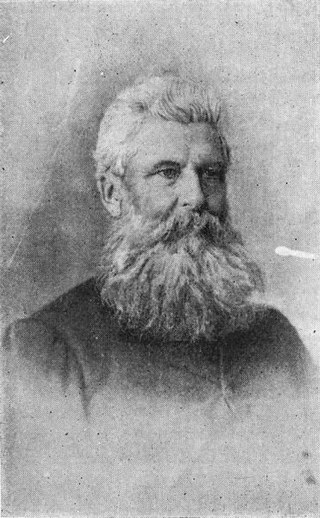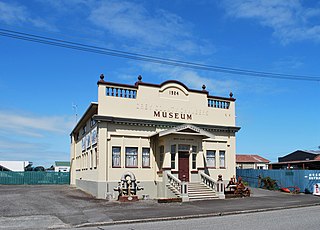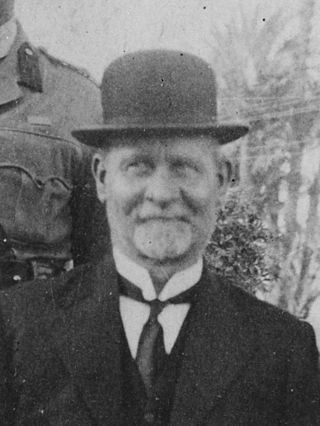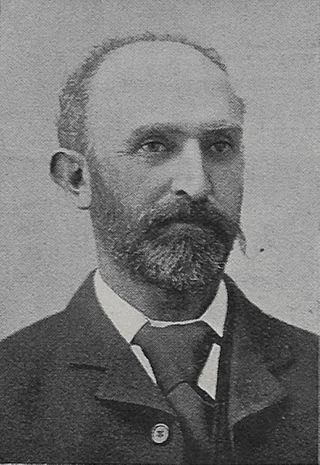
The Ross Borough was the borough council covering the town of Ross, New Zealand and the nearby locality Donoghues, between 1878 and 1972, when Ross Borough was merged back into Westland County.

The Ross Borough was the borough council covering the town of Ross, New Zealand and the nearby locality Donoghues, between 1878 and 1972, when Ross Borough was merged back into Westland County.
The area was first occupied by white settlers in 1865 after the discovery of gold in the Tōtara River and in Jones Creek. [1] Ross was initially administered by the Canterbury Provincial Council based in Christchurch, and then by the successor government agency Westland County from 1868 to 1873, which was succeeded by Westland Province from 1873 to 1876. With the abolition of the provincial government system, the area came under the control of Westland County; equal in name to the organisation from 1873 but with the functions of a county council as opposed to provincial government. In September 1877, some residents of Ross met "to take into consideration the advisability of forming Ross into a municipality"; at the time the area was part of Westland County. The first step was to form a committee that would decide on the boundaries of such a borough. [2] The meeting also passed a unanimous decision to petition the governor—George Phipps, 2nd Marquess of Normanby—to declare Ross a municipality and the required number of signatures was collected. [3] On 31 December 1877, John Benjamin Lopas (acting on behalf of the committee) received a telegram from the government that the borough had been approved and that he had been appointed returning officer and clerk. [4] Three candidates stood for election as mayor of Ross, and Camille Malfroy beat Joseph Grimmond with 79 votes to 75, with William Lockington coming a distant third. [5] [6]
The borough council took over the responsibilities of the Totara Road Board. [7] The borough covered an area of four square miles (10 km2). [1]
In 1972, the borough was merged back into Westland County. [8]
Between 1878 and 1982, Ross had 16 mayors. The following is a complete list:
| Name | Portrait | Term of office | |
|---|---|---|---|
| 1 | Camille Malfroy |  | 1878 |
| 2 | Joseph Grimmond |  | 1878–1881 |
| 3 | Rudolph Hirter | 1881–1883 | |
| 4 | John Hunt Currie | 1883–1884 | |
| (1) | Camille Malfroy |  | 1884–1885 |
| (3) | Rudolph Hirter | 1885–1886 | |
| (2) | Joseph Grimmond |  | 1886–1887 |
| (4) | John Hunt Currie | 1887–1888 | |
| (2) | Joseph Grimmond |  | 1888–1890 |
| 5 | P. Keller | 1890–1892 | |
| (2) | Joseph Grimmond |  | 1892–1893 |
| (4) | John Hunt Currie | 1893–1897 | |
| 6 | David Yorwarth | 1897–1901 | |
| (2) | Joseph Grimmond |  | 1901–1905 |
| 7 | Thomas Wanless Bruce | 1905–1914 | |
| (2) | Joseph Grimmond |  | 1914–1919 |
| 8 | S. P. Evans | 1919–1929 | |
| 9 | Hermann Osmers | 1929–1931 | |
| 10 | John Murdoch | 1931–1933 | |
| (9) | Hermann Osmers | 1933–1935 | |
| 11 | J. J. Rea | 1935 | |
| (10) | John Murdoch | 1935–1938 | |
| 12 | Kenneth Ogilvie May | 1938–1947 | |
| 13 | Alfred Norman Gilmore | 1947–1952 | |
| 14 | Allan Francis Laing | 1952–1956 | |
| – | John Holmes (acting) | 1956 | |
| 15 | Patrick J. Minehan | 1956–1962 | |
| 16 | Stanley Scott | 1962–1972 |

Ross is a small town located in the Westland District on the West Coast of New Zealand's South Island, 27 kilometres (17 mi) south-west of Hokitika and 46 kilometres (29 mi) north-east of Hari Hari by road.

Nelson Province was constituted in 1853 under the New Zealand Constitution Act 1852, and originally covered the entire upper South Island, including all of present-day Buller, Kaikoura, Marlborough, and Tasman districts, along with Nelson City, Grey District north of the Grey River, and the Hurunui District north of the Hurunui River. It was reduced in size by the creation of Marlborough Province in November 1859, then abolished in 1876, along with all the provinces of New Zealand.

Richard Harman Jeffares Reeves was a New Zealand politician of the Liberal Party. He was acting Speaker of the Legislative Council in 1905.

Charles Edward Button was a solicitor, Supreme Court judge, Mayor of Hokitika and later Birkenhead, and an independent conservative Member of Parliament in New Zealand. Born in Tasmania, he came to New Zealand with his wife in 1863. He first lived in Invercargill, then in Westland, and after a brief period in Christchurch, he settled in Auckland. He was an MP for two periods, and when he was first elected to Parliament, he beat his colleague, friend, political opponent, and later Premier Richard Seddon; this was the only election defeat ever suffered by Seddon.

Joseph Petrie was a 19th-century Member of Parliament from Westland, New Zealand.

John Munro was a 19th-century Member of Parliament from the West Coast, New Zealand.
John Bevan was a 19th-century member of the House of Representatives. He was an auctioneer and merchant from Hokitika on the West Coast of New Zealand.

Gerard George Fitzgerald was a 19th-century Member of Parliament in New Zealand. Like his brother James FitzGerald, he was a journalist of considerable ability, and co-founded The Southland Times in 1862. For the last 19 years of his life, he was editor of The Timaru Herald.

Grey County was one of the counties of New Zealand in the South Island.
The 5th New Zealand Parliament was a term of the New Zealand Parliament. Elections for this term were held in 68 European electorates between 14 January and 23 February 1871. Elections in the four Māori electorates were held on 1 and 15 January 1871. A total of 78 MPs were elected. Parliament was prorogued in December 1875. During the term of this Parliament, six Ministries were in power.

The mayor of Blenheim officiated over the borough of Blenheim, New Zealand. The office was created in 1869 when Blenheim became a borough, and ceased with the 1989 local government reforms, when Blenheim Borough was amalgamated with Picton Borough and Marlborough County Council to form Marlborough District. There were 31 mayors of Blenheim. The last mayor of Blenheim, Leo McKendry, was elected as the first mayor of Marlborough.

Westland County, also known as County of Westland, was a local government area on the West Coast of New Zealand's South Island. It existed from 1868 to 1873, and then from 1876 until 1989. In its first incarnation, it constituted the government for the area that was split from the Canterbury Province, with the West Coast Gold Rush having given the impetus for that split. It had the same administrative powers as a provincial council, but the legislative power rested with Parliament in Wellington. The first Westland County was the predecessor to Westland Province.

The Hokitika by-election 1878 was a by-election held in the multi-member Hokitika electorate during the 6th New Zealand Parliament, on 26 June 1878. The by-election was caused by the resignation of incumbent MP Charles Button and was won by Seymour Thorne George, who defeated Gerard George Fitzgerald. Thorne George was suggested as a candidate by the premier, Sir George Grey; he was the Premier's nephew, and lived in the North Island.
The Mayor of Grey, often referred to as the Mayor of Greymouth, officiates over the Grey District of New Zealand which is administered by the Grey District Council with its seat in Greymouth. The current Mayor is Tania Gibson. Two predecessors to this office were the Mayor of Greymouth, officiating over the Greymouth Borough Council from 1868, and from 1877 the chairman of the Grey County Council.
The Greymouth Borough was the borough council covering the urban part of Greymouth, New Zealand between 1868 and 1989, when it became part of Grey District.

The Hokitika Borough was the borough council covering the urban part of the town of Hokitika, New Zealand between 1867 and 1989, when Hokitika Borough and Westland County merged to form Westland District.

Wallsend is a locality in the West Coast region of New Zealand, located on the south side of the Grey River. It is located opposite Taylorville. The two settlements were connected via a suspension bridge for pedestrians that was known as the Taylorville bridge.
The Brunner Borough was a borough on New Zealand's West Coast from 1887 to 1971. It was formed from an area that belonged to Grey County and, at disestablishment, merged back into Grey County.

The Westland Pioneers' Memorial is a statue in Hokitika, New Zealand, commemorating the pioneer settlers of Westland. Unveiled in 1914, the statue had its right arm broken off in 2009 and was subsequently dubbed Venus de Hokitika. The memorial was relocated in 2016 from its original location on the side of State Highway 6 to the centre of a roundabout in one of Hokitika's main streets.
The Mayor of Westport officiated over the borough of Westport in on the West Coast of New Zealand's South Island. The office was created in 1873 when Westport was gazetted as a borough by the Nelson Provincial Council, and ceased with the 1989 local government reforms, when Westport Borough, Buller County and Inangahua County merged to form Buller District. The first mayor of Westport was James Wilson Humphrey.